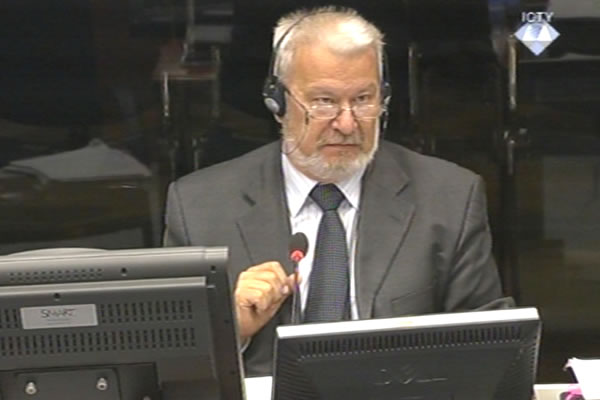Home
KARADZIC’S EXPERT PREPARED TO ACCEPT JUST 500 SREBRENICA VICTIMS
Defense expert Dusan Dunjic contends that only 450 or 500 Srebrenica inhabitants could be considered victims of executions in July 1995. According to Dunjic, only those victims who had their hands tied were actually executed. Dunjic ‘refused to accept’ that the bodies with blindfolds had been executed, as the blindfolds could be military bands that fell down on the faces as the bodies decomposed, Dunjic argued
 Dusan Dunjic, defence witness of Radovan Karadzic
Dusan Dunjic, defence witness of Radovan Karadzic Dusan Dunjic, a professor of forensic medicine from Belgrade, gave evidence in Radovan Karadzic’s defense. Dunjic claimed that the forensic reports on the July 1995 Srebrenica massacre produced by the prosecution experts contained a ‘lot of subjective elements and very little objective evidence’. Karadzic’s expert contends that the findings in the reports were not sufficiently substantiated by facts. In other words, the results could not be replicated by other experts.
Dunjic contends that the evidence does not show that the Srebrenica Muslims buried in the mass graves were mostly victims of executions. Some of them could have died in combat or been killed before or after July 1995, Dunjic noted. In the witness’s view, even those with gunshot wounds to the chest and head that show the same pattern were not victims of the executions as their injuries could have been inflicted post mortem.
Karadzic’s expert was prepared to accept unconditionally that only 450 to 500 victims had been executed. Their hands had been tied with wire or rope. The rest of the victims were questionable, as far as Dunjic was concerned, even those with blindfolds. Dunjic said that the blindfolds could have been military bands that fell from the forehead to the eyes due to the decomposition.
Prosecutor Christopher Mitchell recalled in the cross-examination that the witness never mentioned his ‘military bands’ theory when he testified at the Srebrenica Seven trial and in the first of the two reports he wrote for Karadzic’s defense. The witness first spoke about it after the accused presented the argument in the cross-examination of pathologist Christopher Lawrence in December 2011, the prosecutor noted. Dunjic replied that the thought had occurred to him only at that time, because he saw a video recording of Muslim soldiers wearing head bands. The prosecutor reminded him that the video was not admitted into evidence because its origin was unknown. The soldiers were not the fighters from Srebrenica, the prosecutor noted, adding that the survivors from Orahovac claimed in their testimonies that before the executions Serb soldiers handed out bands to the prisoners, who then had to blindfold each other. Dunjic claimed he was unaware of those testimonies.
Based on the fact that a number of exhumed victims wore winter clothes the witness concluded that they had been killed either before or after the Srebrenica massacre. The witness was then shown a photo from Potocari from July 1995 showing some Muslim men in winter clothes. ‘Pullovers and leather jackets are not winter clothes’, the witness replied.
The Belgrade professor criticized the OTP for destroying the artifacts, including a number of blindfolds: this made it impossible for him to verify the conclusions based on the examination of those items. In the cross-examination, the prosecutor argued that it was standard procedure: those items were a health hazard because of the decomposition of biological matter. Dunjic agreed, but claimed nevertheless that the procedure hadn’t been followed properly.
William Haglund was one of the targets of Dunjic’s criticism. The American forensic pathologist started his evidence today against Ratko Mladic. The prosecutor reminded Karadzic’s expert that in 1996 he had nothing but praise for Haglund when they both worked at Ovcara in Vukovar. Also, Dunjic used Haglund’s method when he examined the bodies found in the Radonjic lake in Kosovo, the prosecutor said. Dunjic replied he still thought very highly of the American doctor but was nevertheless critical of his Srebrenica findings.
Dusan Dunjic’s cross-examination continues tomorrow.Linked Reports
- Case : Karadzic
- 2013-07-22 WITNESS WITH ‘CLEAR CONSCIENCE’ AND PROBLEMATIC PAST
- 2013-07-19 HOW SREBRENICA OPERATION TURNED INTO A CRIME
- 2013-07-18 KARADZIC’S EXPERT WITNESS OFFERS ‘APPROXIMATE’ ANALYSIS
- 2013-07-24 PROSECUTION: WRONG CONCLUSIONS BASED ON SELECTIVE SOURCES
- 2013-07-25 FORCED TO ‘DISARM PEOPLE FORCIBLY’
- 2013-07-29 MENDELJEV DJURIC’S ‘CATEGORICAL DENIALS’
